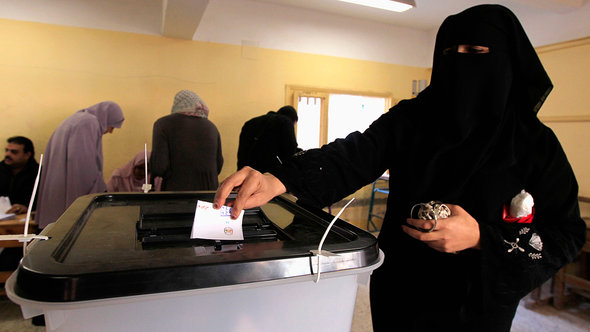Resistance from the ''Cradle of the Revolution''
Flip-flops on his feet, Mohammed Sharif picks his way through the puddles of sewage water and the piles of burst rubbish sacks to the girls' school in Mahalla city centre. The air is thick with the stench of faeces. The queue outside the building, which today serves as a polling station, is several hundred metres long.
For two years now, the mechanic has not missed a single poll; every single time, he has voted for the Islamists. But not today. "Egypt does not belong to a party; it belongs to us all. This constitution only serves the Muslim Brotherhood," says the 33-year-old angrily, before going on to speak about his workshop, which was burgled only recently, about the unbroken rise in gas prices and about invoices that continue to pile up. "We thought that the Islamists would understand us poor people; after all, they suffered under the old regime too. Instead, all they are interested in is power."
56.5 per cent vote "yes"
In Mahalla, a working-class city with just under 500,000 inhabitants in the densely populated Nile delta, many people share Sharif's views. According to projections, about 52 per cent of voters in Gharbia Governorate (to which Mahalla belongs) rejected the starkly religious draft constitution. This means that Gharbia has bucked the national trend. According to unofficial figures, a slight majority, 56.5 per cent of the population in the ten governorates that have already been called to the polls, has voted in favour of the constitution.
"We are tired of being told what to do," says physics student Ayman Abdel Monim from Mahalla. "The preacher in my mosque claims that anyone who votes 'no' to the constitution will go to hell. I mean, what has the constitution got to do with God? Aren't we all Muslims?" Abdel Monim is very disappointed in President Mohammed Mursi. He says: "He's nothing more than a copy of Hosni Mubarak. He even uses the same conspiracy theories. We didn't risk our lives during the revolution for that!"
Rebellion against the new rulers
The anger of the people in Mahalla should make the Muslim Brotherhood pause for thought. People in Egypt say that the city is always before its time. It was here, for example, that thousands of people first took to the streets to protest against the regime in 2006. When the police brutally suppressed a workers' strike on 6 April 2008, angry citizens burned images of Hosni Mubarak in public and stormed the offices of his party, something that had never previously been done before in Egypt. And so, the 6 April movement, whose Internet activists played a leading role in the revolution last year, was born.
Now it is the headquarters of the Muslim Brotherhood's Party for Freedom and Justice that many see as a symbol of oppression. On 27 November, unknown persons set fire to the Islamists' building. A broken window and soot-stained walls bear witness to the attack.
Ten days later, thousands of opponents of both Mursi and the Muslim Brotherhood declared the independence of the "Republic of Greater Mahalla". Activists blocked train tracks, set up road blocks, occupied the building with the city council meets. "We secede from the state of the Muslim Brotherhood" shouted the leaders of the insurrection.
According to a trade union leader at the local Misr weaving mill, the largest textile factory in the country, the declaration of independence was not meant seriously: "The anger with the Muslim Brotherhood, on the other hand, is very real indeed. We fully expected the Islamists to work for fairer wages. Instead, they just tried to fill the trade unions with their own people."

"Mursi needs more time"
Sandwich seller Mohammed Sabri has parked his mobile sandwich stand a few street corners along from the factory. He just cannot understand what all the fuss is about. "No president in the world can rule a country without a constitution," says the skinny young man with the long beard. Sabri has plastered his stand with posters that read "Yes to the constitution" and "Yes to Islamic law".
He does not think it is possible that the constitution will be rejected. "The liberals are afraid of free elections," he says. "They know that they don't have the backing of the streets." An older woman agrees with him: "We have to give Mursi more time. The opposition is just blocking everything. It doesn't have any ideas of its own."
The Muslim Brotherhood recently published figures that indicate that 56.5 per cent are in favour of the constitution. Apart from Gharbia, only the capital, Cairo, has voted against the religious constitution. However, only 33 per cent of those eligible to vote actually did so. The remaining provinces will be called to the polls in a week's time.
Calls for a new referendum
Left-wing and liberal parties are saying that there are instances of electoral fraud and say that the majority voted "no". They are calling for a new referendum. Civil rights groups complained that there were more than 4,000 infringements of the electoral law. They also claim that the referendum was not sufficiently monitored by judges in many localities.
What's more, they say, some people falsely claimed to be judges, the counting of votes was not always monitored, and some Christian women were prevented from taking part. There were reports from several regions of activists being intimidated by radical Islamic Salafists. All told, however, the day of the referendum went peacefully.
When asked about the credibility of the poll, a policeman in Mahalla just laughs. "We only monitor what happens outside the polling stations," he says. "Inside, the Muslim Brotherhood is in control."
Markus Symank
© Qantara.de 2012
Translated from the German by Aingeal Flanagan
Editor: Lewis Gropp/Qantara.de
